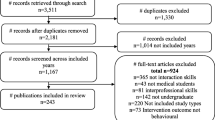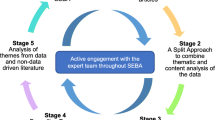Abstract
Medical improvisation (improv) applies theater principles and techniques to improve communication and teamwork with health professionals (HP). Improv curricula have increased over time, but little is known about best practices in curricula development, implementation, and assessment. We sought to complete a state-of-the-art review of medical improv curricula to teach HP learners communication skills. A literature search of MEDLINE and 8 other databases on HP medical education and medical improv communication curricula occurred. We screened 1869 articles published from 2012 to 2022. Seventeen articles were selected for extraction and synthesis. Common curricular goals included improving interprofessional, interpersonal, and empathetic communication. Curricula often lacked alignment between learning objectives and improv exercises. Sessions occurred once (65%) or were longitudinal (35%). Only 24% reported a full description of their intervention. Few reported details on the content of curricula. Evaluations often focused on feasibility and acceptability. Heterogeneity exists in the development, implementation, and assessment of improv curricula. Low-quality evidence was provided to support the use of medical improv to teach communication skills to HP learners. Improv curricula were feasible, and acceptable to learners. We offer recommendations to guide future medical improv curricula development.


Similar content being viewed by others
References
Applied Improvisation Network. Retrieved 2/3/2023 from https://www.appliedimprovisationnetwork.org/
Barry, E. S., Merkebu, J., & Varpio, L. (2022a). State-of-the-art literature review methodology: A six-step approach for knowledge synthesis. Perspectives on Medical Education, 11(5), 281–288.
Barry, E. S., Merkebu, J., & Varpio, L. (2022b). Understanding state-of-the-art literature reviews. Jounal of Graduate Medical Education, 14(6), 659–662.
Bender, M., Veenstra, J., & Yoon, S. (2022). Improving interprofessional communication: Conceptualizing, operationalizing and testing a healthcare improvisation communication workshop. Nurse Education Today, 119, 105530.
Blanco, M., Prunuske, J., DiCorcia, M., Learman, L. A., Mutcheson, B., & Huang, G. C. (2022). The Doctrine guidelines: Defined criteria to report innovations in education. Academic Medinine, 97(5), 689–695.
Cai, F., Ruhotina, M., Bowler, M., Howard, E., Has, P., Frishman, G. N., & Wohlrab, K. (2019). Can I get a suggestion? Medical improv as a tool for empathy training in obstetrics and gynecology residents. Jounal of Graduate Medical Education, 11(5), 597–600.
Del Vecchio, A., Moschella, P. C., Lanham, J. G., & Zavertnik, J. E. (2022). Acting to teach communication skills to nurses. The Clinical Teacher, 19(4), 289–293.
Donovan, E. E., Brown, L. E., Rush, S. K., Greenwell, M. R., Table, B., Zhu, Y. G., & Kearns, K. D. (2020). An applied improvisational pharmacy communication workshop implemented during orientation for first-year pharmacy students. American Journal of Pharmaceutical Education, 84(1), 15–21. https://doi.org/10.5688/ajpe7250
Farris, M. (2021). Improvisation-based curriculum for nutrition and dietetics undergraduate students: an examination in alternative education methods. Northern Illinois University.
Fessell, D., McKean, E., Wagenschutz, H., Cole, M., Santen, S. A., Cermak, R., Zurales, K., Kukora, S., Lantz-Gefroh, V., Kaplan-Liss, E., & Alda, A. (2020). Medical improvisation training for all medical students: 3-year experience. Medical Science Educator, 30(1), 87–90. https://doi.org/10.1007/s40670-019-00885-0
Fu, B. (2019). Common ground: Frameworks for teaching improvisational ability in medical education. Teaching and Learning in Medicine, 31(3), 342–355. https://doi.org/10.1080/10401334.2018.1537880
Gao, L., Peranson, J., Nyhof-Young, J., Kapoor, E., & Rezmovitz, J. (2019). The role of “improv” in health professional learning: A scoping review. Medical Teacher, 41(5), 561–568 https://doi.org/10.1080/0142159X.2018.1505033https://www.tandfonline.com/doi/pdf/full/10.1080/0142159X.2018.1505033?needAccess=true
Grant, M. J., & Booth, A. (2009). A typology of reviews: An analysis of 14 review types and associated methodologies. Health Information & Libraries Journal, 26(2), 91–108.
Grossman, C. E., Lemay, M., Kang, L., Byland, E., Anderson, A. D., Nestler, J. E., & Santen, S. A. (2021). Improv to improve medical student communication. Clinical Teacher, 18(3), 301–306. https://doi.org/10.1111/tct.13336
Higgins, K., & Nesbitt, C. (2021). Improvisation theater exercises: A novel approach to teach communication skills. Journal of Nursing Education, 60(2), 116–119. https://doi.org/10.3928/01484834-20210120-12
Hoffmann-Longtin, K., Organ, J. M., Helphinstine, J. V., Reinoso, D. R., Morgan, Z. S., & Weinstein, E. (2018). Teaching advocacy communication to pediatric residents: The efficacy of applied improvisational theater (AIT) as an instructional tool. Communication Education, 67(4), 438–459. https://doi.org/10.1080/03634523.2018.1503314
Hubinette, M., Dobson, S., Scott, I., & Sherbino, J. (2017). Health advocacy. Medical Teacher, 39(2), 128–135.
Kaplan-Liss, E., Lantz-Gefroh, V., Bass, E., Killebrew, D., Ponzio, N. M., Savi, C., & O’Connell, C. (2018). Teaching medical students to communicate with empathy and clarity using improvisation. Academic Medicine, 93(3), 440–443. https://doi.org/10.1097/ACM.0000000000002031
King, J., Levine, R., Haidet, P., Clever, S. L., Wright, S., & Shochet, R. (2008). The art of improvisation: a tool for medical students to develop patient communication skills. Journal of General Internal Medicine, 23, 212–212.
Kolb, D. A. (2014). Experiential learning: experience as the source of learning and development. FT press.
Kukora, S. K., Batell, B., Umoren, R., Gray, M. M., Ravi, N., Thompson, C., & Zikmund-Fisher, B. J. (2020). Hilariously bad news: medical improv as a novel approach to teach communication skills for bad news disclosure. Academic Pediatrics, 20(6), 879–881. https://doi.org/10.1016/j.acap.2020.05.003
Li, W., Scherr, C. L., Fenter, R. B., Watson, K. L., & Wicklund, C. A. (2022). Exploring a brief medical improvisational performing arts intervention for genetic counseling graduate students. Journal of Genetic Counseling, 31(5), 1193–1205.
McGowan, J., Sampson, M., Salzwedel, D. M., Cogo, E., Foerster, V., & Lefebvre, C. (2016). PRESS peer review of electronic search strategies: 2015 guideline statement. Journal of Clinical Epidemiology, 75, 40–46.
Neel, N., Maury, J. M., Heskett, K. M., Iglewicz, A., & Lander, L. (2021). The impact of a medical improv curriculum on wellbeing and professional development among pre-clinical medical students. Medical Education Online, 26(1), 1961565. https://doi.org/10.1080/10872981.2021.1961565
Online document Watson and Fu (2013-2023). The ninth international medical improv train the trainer workshop. Retrieved January 25, 2023 from https://www.medicalimprov.org/upcoming-workshop
Proudfit, S. (2016). From Neva Boyd to viola spolin: How social group work in 1920s’ settlement houses defined collective creation in 1960s’ theatres. Women, Collective Creation, and Devised Performance: The Rise of Women Theatre Artists in the Twentieth and Twenty-first Centuries (pp. 51–65). Berlin: Springer.
Reed, D. A., Beckman, T. J., Wright, S. M., Levine, R. B., Kern, D. E., & Cook, D. A. (2008). Predictive validity evidence for medical education research study quality instrument scores quality of submissions to JGIM’s Medical Education Special Issue. Journal of General Internal Medicine, 23, 903–907.
Sawyer, T., Fu, B., Gray, M., & Umoren, R. (2017). Medical improvisation training to enhance the antenatal counseling skills of neonatologists and neonatal fellows: A pilot study. The Journal of Maternal-Fetal & Neonatal Medicine, 30(15), 1865–1869. https://doi.org/10.1080/14767058.2016.1228059
Shochet, R., King, J., Levine, R., Clever, S., & Wright, S. (2013). ‘Thinking on my feet’: an improvisation course to enhance students’ confidence and responsiveness in the medical interview. Education for Primary Care, 24(2), 119–124.
Thomas, P. A., Kern, D. E., Hughes, M. T., & Chen, B. Y. (2016). Curriculum development for medical education: a six-step approach. JHU Press.
Thompson, K. L., & Stetzler, S. K. (2019). Medical improvisation training as a vehicle to improve empathetic communication skills in nutrition and dietetics students an exploratory pilot intervention. Topics in Clinical Nutrition, 34(2), 114–124. https://doi.org/10.1097/tin.0000000000000175
Watson, K. (2011). Perspective: serious play: teaching medical skills with improvisational theater techniques. Academic Medicine, 86(10), 1260–1265. https://doi.org/10.1097/ACM.0b013e31822cf858
Watson, K., & Fu, B. (2016). Medical Improv: a novel approach to teaching communication and professionalism skills. Annals of Internal Medicine, 165(8), 591–592. https://doi.org/10.7326/M15-2239
Willis, G. B., & Artino, A. R., Jr. (2013). What do our respondents think we’re asking? Using cognitive interviewing to improve medical education surveys. Journal of Graduate Medical Education, 5(3), 353–356.
Zelenski, A. B., Saldivar, N., Park, L. S., Schoenleber, V., Osman, F., & Kraemer, S. (2020). Interprofessional Improv: Using theater techniques to teach health professions students empathy in teams. Academic Medicine, 95(8), 1210–1214. https://doi.org/10.1097/acm.0000000000003420
Zenk, L., Hynek, N., Schreder, G., & Bottaro, G. (2022). Toward a system model of improvisation. Thinking Skills and Creativity, 43, 100993.
Acknowledgements
We would like to acknowledge Jan Glover, medical librarian, for reviewing the literature searches using the PRESS checklist (McGowan et al. 2016).
Funding
This research did not receive any specific grant from funding agencies in the public, commercial, or not-for-profit sectors. The authors did not receive support from any organization for the submitted work.
Author information
Authors and Affiliations
Contributions
CAC Conceptualization, data curation, formal analysis, investigation, methodology, roles/writing—original draft. DMW Conceptualization, methodology, Writing—review and editing, supervision. JMS Conceptualization, data curation, formal analysis, investigation, methodology, roles/writing—original draft. NM Conceptualization, data curation, formal analysis, investigation, methodology, supervision, roles/writing- review and editing.
Corresponding author
Ethics declarations
Conflict of interest
The authors declare that they have no conflict of interests.
Additional information
Publisher's Note
Springer Nature remains neutral with regard to jurisdictional claims in published maps and institutional affiliations.
Supplementary Information
Below is the link to the electronic supplementary material.
Rights and permissions
Springer Nature or its licensor (e.g. a society or other partner) holds exclusive rights to this article under a publishing agreement with the author(s) or other rightsholder(s); author self-archiving of the accepted manuscript version of this article is solely governed by the terms of such publishing agreement and applicable law.
About this article
Cite this article
Chan, C.A., Windish, D.M., Spak, J.M. et al. State-of-the-art review of medical improvisation curricula to teach health professional learners communication. Adv in Health Sci Educ (2023). https://doi.org/10.1007/s10459-023-10296-x
Received:
Accepted:
Published:
DOI: https://doi.org/10.1007/s10459-023-10296-x




